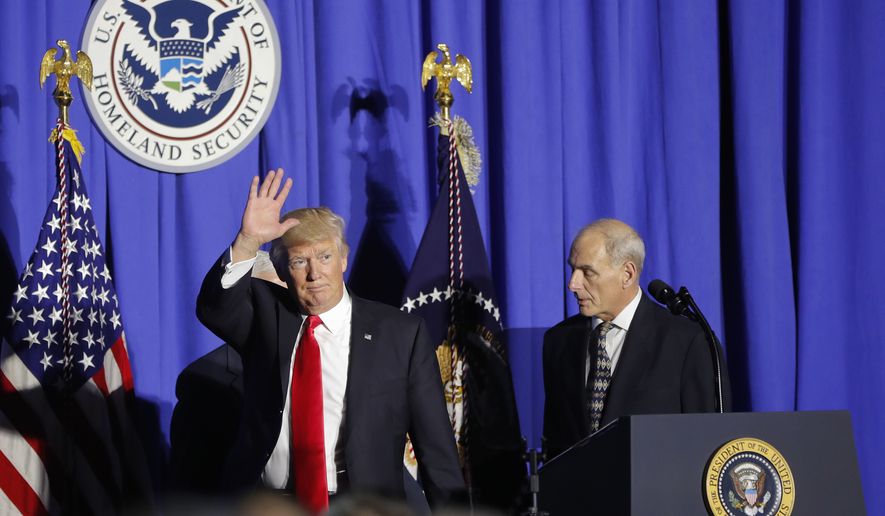President Trump on Wednesday ordered the Homeland Security Department to begin releasing a name-and-shame list of sanctuary cities, listing the specific crimes such as murder or robbery committed by those who have been released back into their communities under the sanctuary policies.
That was one of a number of less-noticed but potentially far-reaching moves tucked inside two new executive orders erasing decades of previous immigration enforcement policy and replacing it with the Trump plan, which calls for aggressive enforcement of existing laws.
Border Patrol and interior enforcement agents have been unshackled from the limits imposed by former President Barack Obama, as Mr. Trump said he wants to see them doing the jobs they were hired for.
He said he wants to enlist those local police and sheriff’s offices that are eager to enforce immigration law, and will punish those that throw up roadblocks — including the new name-and-shame list.
Some 279 cities and counties refused to cooperate on at least some deportations in 2016, accounting for 2,008 immigrants who were shielded, according to U.S. Immigration and Customs Enforcement. Each of those immigrants’ convictions will now be publicly listed so residents can see the level of crimes committed by those released into their communities, under the Trump orders.
Analysts said that list could help rally internal opposition to sanctuary cities, which are already rallying to defy Mr. Trump.
SEE ALSO: Donald Trump eviscerates Obama’s immigration policy in two executive orders
“We will fight against attempts to undermine our values and the security of our cities,” said the group Cities for Action, a coalition of big municipalities that support sanctuary policies. “As mayors and county executives nationwide have made clear today, we will continue to provide for all in our communities — regardless of where they come from — and work to continue building trust between city residents and law enforcement.”
In addition to the shame list, Mr. Trump ordered Homeland Security to produce a list four times a year of all illegal immigrants serving time in federal or state prisons, or being held for trial.
And in another striking move, Mr. Trump ordered Homeland Security officials to begin releasing more information on illegal immigrants. He said the Privacy Act, which has regularly shielded information about illegal immigrants from public disclosure, will no longer apply to anyone who isn’t a citizen or green card holder.
That could give the public a new depth of transparency, enabling them to see the types of illegal immigrants the government is encountering.
One part of the new orders would allow Homeland Security to ship illegal immigrants caught crossing the border from Mexico back into Mexico, even as they await the outcome of their deportation cases in the U.S.
That’s allowed under existing law, but legal analysts said they’d never heard of it being used, and debated how far it might be used. But immigrant-rights advocates said it could hurt migrants who need protections.
“Given that many of the people crossing the border today are children and families fleeing violence in the Northern Triangle countries of Central America, invoking this provision threatens to undermine our commitment to refugee protections,” said Tom Jawetz, vice president for immigration policy at the Center for American Progress.
The Mexican Embassy in Washington did not respond to a request for comment on the provision Wednesday night.
Experts said it’s an open question whether Mexico could stymie that part of Mr. Trump’s orders by refusing to take back those who crossed over its northern border into the U.S.
Another lesser-noticed provision of the new orders would push Homeland Security to collect fines from both illegal immigrants and “those who facilitate their presence” in the U.S.
That could potentially include sanctuary colleges and universities that protect illegal immigrants, and businesses that hire unauthorized workers.
Current law calls for fines of more than $20,000 per illegal immigrant for companies that are repeat offenders.
Conspiracy to harbor an illegal immigrant carries potential jail time or a fine of up to $10,000.
• Stephen Dinan can be reached at sdinan@washingtontimes.com.




Please read our comment policy before commenting.